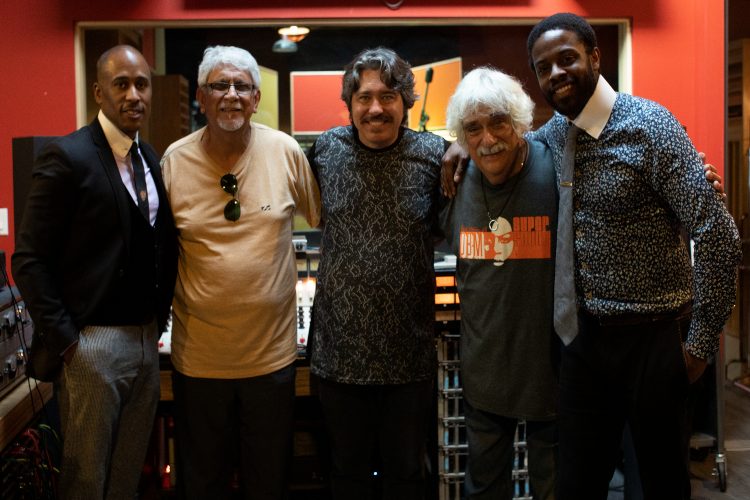|
Getting your Trinity Audio player ready…
|
In the field of astrodynamics, azimuth is essentially a way of navigating based on an established location, usually true North. Even its etymology suggests use in voyaging as it was derived from the Arabic term as-sumūt, roughly translated into “the directions.” It is an excellent descriptor for a trio that has been spanning outward from set ideas into new territories. While the group has performed together for nearly half a century, its latest, Azymuth JID004 proves that time has not docked its sonic travels.
The release is also a fitting follow-up to its immediately preceding chapter of Ali Shaheed Muhammad and Adrian Younge’s unique series. Like Marcos Valle, Azymuth used Brazilian samba as its start, drifting out to incorporate concepts from jazz, funk, disco, and psychedelic rock to create its own form of Música Popular Brasileira (MPB). This trajectory did not run parallel to the vocalist’s, but rather intersected it. The ensemble of pianist-keyboardist Jose Roberto Bertrami, bassist Alex Malheiros, and drummer Ivan Conti originally went by many different names. In primarily creating cover music, they were known first as Grupo Seleção. When later joined by Valle, they went as Som Ambiente (CID, 1972) and then Fly Cruzeiro (Brazil by Music, Believe Musc/The Orchard Music, 1972). In 1973, they provided the soundtrack to O Fabuloso Fittipaldi, a film honoring the great Brazilian Formula 1 driver Emerson Fittipaldi. It is in these sessions the name Azymuth emerged, borrowing its title from one of the Valle-penned compositions.
The group’s self-titled release in 1975 (Azimuth, Som Livre) laid out its trademark sound blending traditional Brazilian rhythms with contemporary synthesizers and improvisation. Later, Azymuth was the first band to utilize electronic instruments at the Teatro Municipal de São Paulo; in fact, some credit them as progenitors of modern EDM. Agua Nao Come Mosca (Atlantic, 1977) spread the trio’s music throughout the world, setting the stage for its most successful album. Light as a Feather (Milestone, 1979) would sell over half a million copies with the song “Jazz Carnival” becoming a hit. In turn, this generated a significant following for much of the 1980s.
Over the ensuing decades, the group would continue to record and tour albeit with a personnel change; when Bertrami died in 2012, Kiko Continentino stepped into the role. They also obtained a new following from various DJs using their work, including MF Doom, Madlib, Jazzanova, and Flying Lotus. Given this backdrop and Muhammad and Younge’s own histories, it should come as no surprise that so much of JID004 seems designed for sampling. The various hooks – from the mid-tempo guitar on “Sumaré” to, the pop-influenced piano on “Pulando Corda”- feel like building blocks for music to come.
The opening track, “A Redor Do Samba,” or “Around Samba” in Portuguese, well-encapsulates the band’s long-standing concept as it starts with style as a focal point around which it circumnavigates using a relaxed guitar and upbeat tempo to propel to the shores of jazz-funk rhythms with an organ and keyboards serving as the waves pushing them in one direction or another, sometimes pacifically and other times virulently. On “Sumaré,” these chordal instruments mimic a Philly soul style orchestral sound as powerhouse bass lays down a deep groove.
Most compositions are smoother and set foot on a gentler ground than much of the band’s classic recordings. This is perhaps best exhibited on “Fall Afternoon” where the pyrotechnic electronic timbres well known from “Jazz Carnival” are replaced with a softer saxophone led walk through a path alongside trees with changing colored leaves. But this is not the case for the entirety of the album. “Apocalíptico” is built around an aggressive bassline, raucous and seemingly freely-improvised synthesizers and keyboards, and variable time signatures. The end product is fascinating yet rougher than the sounds to which Azymuth’s name is typically associated. Slightly more subdued, “Cat Jump” adopts thunderous percussion and baritone sax to invoke a large cat (or possibly a much smaller feline friend) jumping across platforms.
At 41 minutes, JID004 is longer than its overly short predecessors, each of which clocked in under a half-hour. Despite its longer duration, however, it is still missed an opportunity. Given the Azymuth’s long history with Valle and that Muhammad and Younge teamed up with him as part of this same series, it would have been nice for him to have taken a guest spot on one of the tunes. His soothing tones would be particularly welcome on various portions of either “Sumaré” or “Quiet Storm.”
Despite this minor misgiving, however, Azymuth’s contribution is a welcome addition to the Jazz is Dead series. It is generally steeped in the sounds of years past, particularly the 1970s and 1980s. But, as with samba itself, the group is neither shying away from that fact nor content to confine themselves to it. JID004 is not afraid to explore new avenues and affirms that concepts from more traditional Brazilian musical forms can still grow and produce novel sonic ideas, both by the artists themselves and by future beat-makers who will revisit them.
Tracklist: (1) A Redor Do Samba, (2) Sumaré, (3)Cat Jump, (4) Fall Afternoon, (5) Friendship Samba, (6), Apocalíptico, (7) Pulando Corda, (8) Quiet Storm
Personnel: Alex Malheiros (bass), Ivan “Mamão” Conti (drums), Kiko Continentinho (synthesizer, keyboards, piano), Ali Shaheed Mahammad (various instruments), Adrian Younge (various instruments).







Leave a Reply